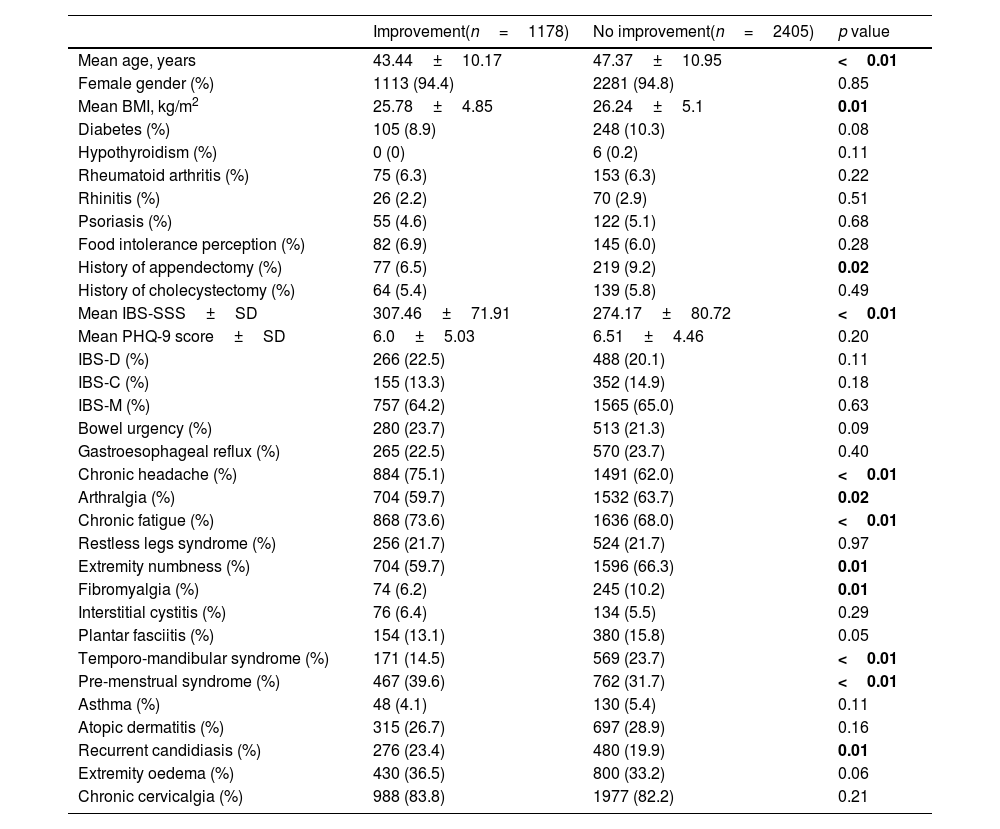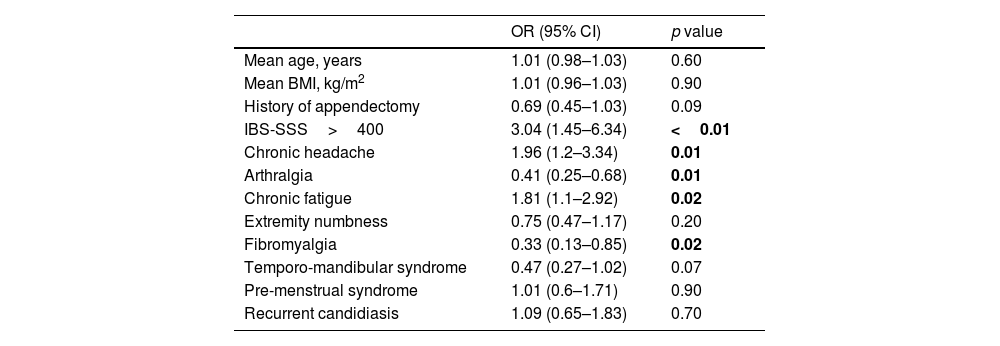Different diets have emerged as potential therapeutic options for patients with irritable bowel syndrome (IBS).
ObjectiveTo identify predictors of improvement after a low-FODMAP, low-starch and low-sucrose diet among patients with IBS.
MethodsWe performed a descriptive cross-sectional study including patients with IBS according to Rome IV criteria undertaking a social-media based program with a two-week dietary intervention. Patients completed an online survey before and after the intervention including the presence of intestinal and extra-intestinal symptoms, the IBS-SSS (irritable bowel syndrome symptoms severity scale) and the PHQ-9 (patient health questionnaire-9). Clinical improvement was defined as a decrease of at least 50% in IBS-SSS post dietary intervention. Variables associated with symptomatic response were identified with logistic regression analysis. A clinical score to predict response was created and tested with a with a receiver operating characteristic (ROC) curve analysis.
ResultsA total of 3583 patients with IBS were included. Mean IBS-SSS before and after dietary intervention was 295.5±52.32 and 240±48.66, respectively (p=0.01); 1178 (32.8%) patients showed clinical improvement. A mean basal IBS-SSS >400 (OR 3.04), chronic headache (OR 1.96), and chronic fatigue (OR 1.81) were significantly associated with symptomatic response. Patients with arthralgia (OR 0.41) and/or fibromyalgia (OR 0.33) were less likely to improve. Each variable received the following individuals scores: IBS-SSS >400: +2, chronic headache: +1.5, chronic fatigue: +1, arthralgia: −1, and fibromyalgia: −1. The ROC curve analysis of the proposed score showed an area under the curve of 0.72 (95% CI 0.69–0.76). A score ≥3 had a sensitivity of 72.64% and specificity of 60.56% for predicting symptomatic improvement.
ConclusionsThere are clinical variables that could serve as reliable predictors of response to a low-FODMAP, low-sucrose, low-starch diet among patients with IBS. Further research is needed to understand the link between the presence of extra-intestinal symptoms and clinical improvement after dietary interventions for IBS.
Existen múltiples dietas posibles para el tratamiento de pacientes con síndrome de intestino irritable (SII).
ObjectivoIdentificar predictores de respuesta a la dieta baja en FODMAP, baja en almidón y baja en sacarosa en pacientes con SII.
MétodosRealizamos un estudio descriptivo transversal que incluyó a pacientes con SII según los criterios de Roma IV, que realizaron un programa basado en redes sociales con una intervención dietética de dos semanas. Los pacientes completaron una encuesta en línea antes y después de la intervención, que incluía la presencia de síntomas intestinales y extraintestinales, el SII-SSS (escala de gravedad de los síntomas del síndrome del intestino irritable) y el PHQ-9 (cuestionario de salud del paciente-9). La mejoría clínica se definió como una disminución de al menos el 50% en el SII-SSS después de la intervención dietética. Las variables asociadas con la respuesta sintomática se identificaron mediante análisis de regresión logística. Se creó y probó una puntuación clínica para predecir la respuesta con un análisis de la curva de características operativas del receptor (ROC).
ResultadosSe incluyeron un total de 3.583 pacientes con SII. La media del SII-SSS antes y después de la intervención dietética fue de 295,5±52,32 y 240±48,66, respectivamente (p=0,01); 1.178 (32,8%) pacientes presentaron mejoría clínica. Un IBS-SSS basal medio>400 (OR 3,04), cefalea crónica (OR 1,96) y fatiga crónica (OR 1,81) se asociaron significativamente con la mejoría sintomática. Los pacientes con artralgias (OR 0,41) y/o fibromialgia (OR 0,33) tuvieron menos probabilidades de mejorar. Cada variable recibió las siguientes puntuaciones individuales: SII-SSS>400: +2; cefalea crónica: +1,5; fatiga crónica: +1; artralgias: −1, y fibromialgia: −1. El análisis de la curva ROC de la puntuación propuesta mostró un área bajo la curva de 0,72 (IC 95% 0,69-0,76). Una puntuación≥3 tuvo una sensibilidad del 72,64% y una especificidad del 60,56% para predecir la mejoría sintomática.
ConclusionesExisten variables clínicas que podrían servir como predictores de respuesta a una dieta baja en FODMAP, baja en sacarosa y baja en almidón en pacientes con SII. Se necesitan más estudios de investigación para comprender el vínculo entre la presencia de síntomas extraintestinales y la mejoría clínica después de intervenciones dietéticas para el SII.











